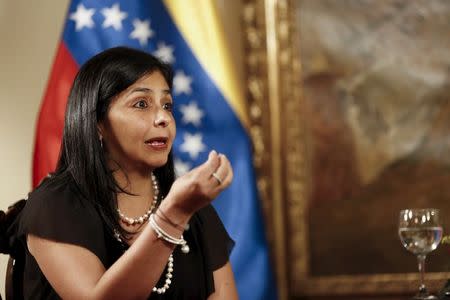Prisoner release not on the table in U.S. talks: Venezuela
By Brian Ellsworth CARACAS (Reuters) - Talks to improve diplomatic relations between the United States and Venezuela's socialist government do not include discussion of releasing opposition demonstrators jailed as a result of protests in 2014, Venezuela's foreign minister told Reuters. After more than a decade of acrimonious relations, Caracas and Washington have opened a cautious rapprochement by trying to cooperate in areas of mutual interest such as peace negotiations in Colombia and elections in Haiti. But Foreign Minister Delcy Rodriguez said there is no discussion of releasing opposition activists who were arrested for violent and illegal behavior, insisting it would set a dangerous precedent of apologizing for "terrorism." "No, that's not on the agenda of the talks," Rodriguez said in an interview late on Tuesday. "These are citizens who are in jail for committing crimes that are punishable under Venezuelan law, and who also subjected Venezuela's population to terrorism." A senior U.S. official told Reuters that Washington has pressed the government of President Nicolas Maduro to release political prisoners, and said that progress on the issue would be crucial to improving ties. Washington is also seeking to ensure a free and fair vote in the Dec. 6 parliament elections, which polls suggest the ruling Socialist Party will lose, the official said. Venezuelan officials dispute the term "political prisoners," and point out that protesters damaged private property, restricted free transit by barricading thoroughfares, and set booby-traps that killed innocent bystanders. "We will not allow any country or any extreme right-wing faction to justify terrorist actions," Rodriguez said. "That is inexcusable." Venezuela's government says better communication with Washington will lead to less interference in its domestic affairs by the United States, the largest buyer of its oil.The U.S. State Department is seeking to reduce friction with Venezuela, which remains the continent's harshest critic of U.S. foreign policy, after agreeing to restore ties with communist-run Cuba. TENSE RELATIONS Neither nation has an ambassador to the other. Venezuelan leaders expect the envoys will be named soon, though U.S. officials are less optimistic. International human rights groups have criticized Venezuela for arrests linked to the demonstrations, most notably those of protest leader Leopoldo Lopez and former mayor Daniel Ceballos. U.S. officials have also insisted on release of the two, who in May and June staged a hunger strike in part to protest the issue of prisoners. The opposition says street demonstrators were making legitimate use of the right to protest, and accuse the government of arbitrary detentions and abuse by security forces. Venezuelan rights group Penal Forum says 3,765 people were arrested during the protests and that 75 remain imprisoned for political reasons. The State Department on Tuesday named that group as one of two organizations to receive the 2014 "Human Rights Defender Award" for its work in connection to the protests. Relations between the United States and Venezuela have been rocky since the era of late socialist leader Hugo Chavez. The White House in 2002 blamed Chavez for an opposition coup that briefly deposed him, and then backtracked when he returned to power. The two countries over the years have repeatedly expelled diplomats after testy exchanges. Communication improved after a meeting between Maduro and U.S. President Barack Obama at a regional summit in Panama in April, said Rodriguez, a lawyer who for years played competitive table tennis. "We are in the process of seeking the regularization of relations," she said, adding that the talks are going "very well." As a result of the improved ties, Maduro and top Venezuelan officials including Rodriguez have met with U.S. diplomats such as Tom Shannon, the State Department's legal counsel and an expert on Latin America, to discuss areas of cooperation. Venezuela has agreed to put its aid efforts to Haiti under a U.N.-coordinated program after years of running separate multi-million-dollar aid programs, according to the U.S. official. Despite the improved ties, Rodriguez said Venezuela still wants the U.S. government to cut the number of staff at its embassy in Caracas. Maduro called for the reduction in response to an alleged coup plot in February. (Additional reporting by Lesley Wroughton in Washington; Editing by Andrew Cawthorne and Kieran Murray)




